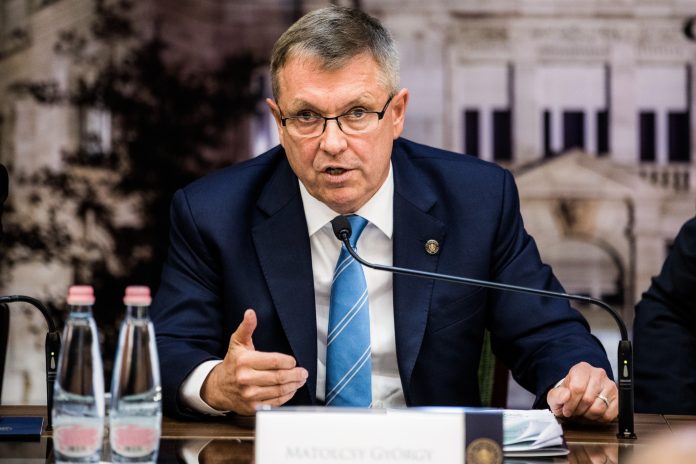Gyorgy Matolcsy, the governor of Hungary’s central bank, has criticised the government’s mid-2021 economic policy change and said cabinet members are trying to limit the central bank’s independence, BNE IntelliNews reports.
He accused National Economy Minister Marton Nagy, who was MNB deputy from 2017 to 2020, of leading the attacks.
Matolcsy was speaking at an award ceremony organised by the Budapest Stock Exchange on February 29. According to Hungary’s top banker, Hungary’s consumption-driven economic growth model is doomed to fail and the government needs to return to an investment-oriented approach while maintaining the deficit and external balance.
He believes Hungary needs to focus on high value-added sectors that will drive the technological transition in the coming decades. Matolcsy called for restoring fiscal discipline and external balance, increasing competitiveness and productivity reforms.
The central bank governor advocated a change in economic policy to get Hungary out of the middle-income trap, with a shift from an extensive to an intensive growth model that requires investment in areas neglected by the cabinet, health and education.
In previous reports, the Hungarian National Bank (GNB) has claimed that Hungary’s labour productivity performance is two-thirds of the EU average and 40-50% compared to the top five EU countries.
There is a serious threat that macroeconomic imbalances, combined with high inflation and low productivity in agriculture and other areas of the economy, will result in the Hungarian economy being a loser this decade, he said earlier.
Matolcsy also called the government’s measures to fight inflation a “massive disaster”, referring to price caps that have led to market imbalances. His criticism highlights the conflict between the central bank’s focus on price stability and the government’s pro-growth programme, which has led to budget overspending and higher inflation.
He said at the BSE awards ceremony on Thursday that the government had started undermining the autonomy of the MNB from mid-2021, both covertly and overtly, and named Marton Nagy, a former deputy, as being behind the attacks. Matolcsy also revealed personnel details of the strained relationship with his former subordinate. He told business leaders:
“I informed the ministers that it was necessary to terminate his (Marton Nagy’s) employment due to professional errors, his managerial approach deemed unacceptable, and his conduct that ran counter to the central bank’s interests.”
Nagy was sacked by Matolcsy in May 2020. Nagy replied later in the day, saying:
“Thank God, Matolcsy is no longer my boss.”
He said the government remains committed to an investment-led, export-oriented economic model, rebutting the central bank governor’s criticism of the government’s policies. In the short term, a recovery in consumption is necessary to restart growth, he added.
Government officials and even Hungarian Prime Minister Viktor Orbán have criticised MNB for failing to effectively tackle inflation. The Hungarian leader has credited the MNB with bringing inflation down to single-digit levels by the end of 2023 by launching a price comparison platform or introducing mandatory discounts for large foreign retailers.
When the ECB published its opinion on the finance ministry’s draft amendments, the issue of central bank independence came to the fore earlier this week. The plan aims to expand the powers of the bank’s supervisory board, most of whose members are close to the ruling party, and change the powers of the board of directors, which the ECB said would weaken the bank’s independence.
Finance Minister Mihaly Varga said the government respects the central bank’s independence and aims to increase its transparency. The ministry is consulting with the ECB, exploring the possibility of extending the audit committee’s supervisory powers to activities that do not affect the central bank’s fundamental objectives.
On Thursday evening, the prime minister’s spokesman said the government respects the central bank’s independence.
In the afternoon, the forint’s exchange rate against the euro fell to a one-year low of 394.5 after a spat between the government. The central bank’s decision to cut the benchmark rate by 100 bps at Tuesday’s rate-setting meeting sent the forint down a slippery slope. Technical signs point to further weakness as the 390 level was considered a strong resistance level and the forint broke out of this narrow range after a long period.
Speaking at the BSE gala, Deputy Governor Barnabas Virag said that MNB has decided to temporarily accelerate rate cuts and the pace of easing may slow down in the coming months. Virag also called for a cautious monetary policy and left unchanged expectations for the benchmark rate at 6-7 per cent for mid-year.
